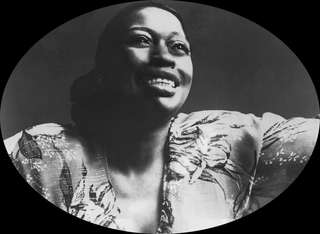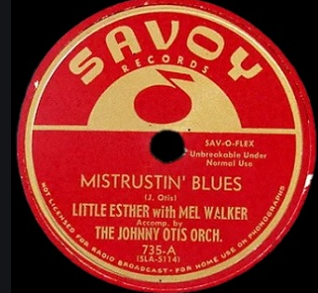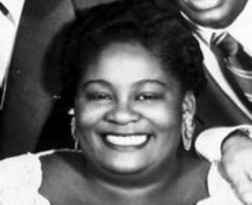Related Research Articles

Johnny Otis was an American singer, musician, composer, arranger, bandleader, talent scout, disc jockey, record producer, television show host, artist, author, journalist, minister, and impresario. He was a seminal influence on American R&B and rock and roll. He discovered numerous artists early in their careers who went on to become highly successful in their own right, including Little Esther Phillips, Etta James, Big Mama Thornton, Johnny Ace, Jackie Wilson, Little Willie John, Hank Ballard, and The Robins, among many others. Otis has been called the "Godfather of Rhythm and Blues".

Esther Phillips was an American singer, best known for her R&B vocals. She also performed pop, country, jazz, blues and soul music.
"Pledging My Love" is a blues ballad. It was written by Ferdinand Washington and Don Robey and published in 1954.
"Two Hearts, Two Kisses " is a popular song, written by Otis Williams and Henry Stone in 1954. It was originally recorded by Otis Williams and the Charms, it first reached the Billboard R&B chart on March 23, 1955, and lasted 12 weeks on the chart, peaking at number 8.

"Bird Dog" is a song written by Boudleaux Bryant and recorded by the Everly Brothers. It was released in 1958 and was a #1 hit on the Billboard Country Chart for 6 weeks. The song also hit number one on the U.S. Billboard Hot 100 as well as peaking at number two for three weeks on the R&B charts.
"Share Your Love with Me" is a song written by Alfred Braggs and Deadric Malone. It was originally recorded by blues singer Bobby "Blue" Bland. Over the years, the song has been covered by various artists, most notably Aretha Franklin who won a Grammy Award for her 1969 rendition. Other artists who covered the song include The Band in 1973, Kenny Rogers in 1981, and most recently, Van Morrison in 2016.
"Happy People" is a 1974 single by The Temptations, co-written by Lionel Richie. It was the first single from the A Song For You album. In the United States, the single went to #1 on the R&B chart and #40 on the Billboard Hot 100 singles chart. "Happy People" also peaked at #11 on the disco/dance chart. The single was the first Temptations release without the guidance of Norman Whitfield since 1966.
"Kiddio" is a 1960 R&B/pop song written by Brook Benton & Clyde Otis and released as a single by Brook Benton. The song was first recorded and released in 1957 by Teddy Randazzo while both he and Benton recorded for RCA's Vik label. The single was the fourth time in a year that Brook Benton had topped the R&B charts. However, two of those times, he'd hit number one with duet partner, Dinah Washington. "Kiddio" also continued Brook Benton's popularity on the pop charts by making it his fifth top-ten pop single.
"Every Beat of My Heart" is a rhythm and blues song by Johnny Otis. It was first recorded in 1954 by his group, The Royals.
"A Lover's Question" is a 1958 Pop, R&B hit for Clyde McPhatter. The single was written by Brook Benton and Jimmy T. Williams and was Clyde McPhatter's most successful Pop and R&B release. The musical arrangement was by Belford Hendricks who was a close friend of Clyde and the arranger of many hit songs for a multitude singing stars. The bass singer is Noah Hopkins. "A Lover's Question" made it to #6 on the Billboard Hot 100 and was #1 for one week on the R&B chart.
"I Wonder" is a 1944 song written and originally performed by Pvt. Cecil Gant. The original version was released on the Bronze label, before Gant re-recorded it for the Gilt-Edge label in Los Angeles. The record made it to number one on the Juke Box Race Records chart and was Pvt. Gant's most successful release. In February 1945, pianist, Roosevelt Sykes hit number one with his version of the song. Roosevelt Sykes version is notable in that it replaced Pvt. Gant's version, at number one on the Juke Box Race Records chart.
"I Want To Be Loved " is a 1947 ballad written by and recorded by Savannah Churchill and The Sentimentalists. The single was Savannah Churchill's most successful release on the R&B charts, spending six months on the chart and reaching number one on the R&B Juke Box chart.

"Mistrustin' Blues" is a song written by Johnny Otis. It was sung by Little Esther and Mel Walker, accompanied by The Johnny Otis Orchestra, and released on the Savoy label. The record was the second collaboration between Johnny Otis and Little Esther. "Mistrustin Blues" was their second number one record on the R&B chart, which it topped for four weeks. It was ranked No. 10 on Billboard magazine's year-end list of R&B records for 1950 based on sales.
"Funny How Time Slips Away" is a song written by Willie Nelson and first recorded by country singer Billy Walker. Walker's version peaked at number 23 on the Hot C&W Sides chart. The tune is slightly similar to "When Two Worlds Collide", which was written by Roger Miller and Bill Anderson.

Marie Adams was an American gospel and R&B singer, who became popular in the 1950s particularly for her work with Johnny Otis.
References
- ↑ "Johnny Otis Quintette With The Robins And Little Esther / The Beale St. Gang – Double Crossing Blues / Back Alley Blues (1950, Vinyl)". Discogs.com. Retrieved 3 May 2021.CS1 maint: discouraged parameter (link)
- ↑ Whitburn, Joel (2004). Top R&B/Hip-Hop Singles: 1942–2004. Record Research. p. 445.
- ↑ Whitburn, Joel (2004). Top R&B/Hip-Hop Singles: 1942–2004. Record Research. p. 459.
- ↑ "Marv Goldberg's R&B Notebooks - LITTLE ESTHER". Uncamarvy.com. Retrieved 2018-12-21.